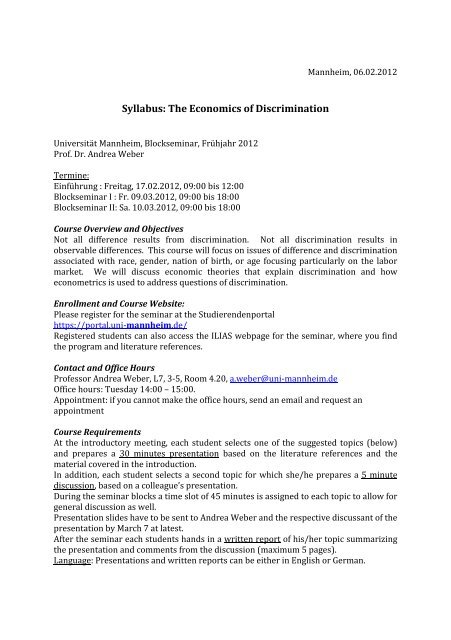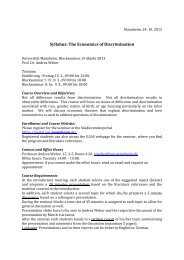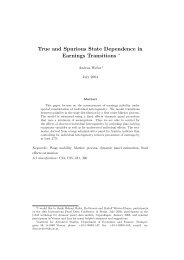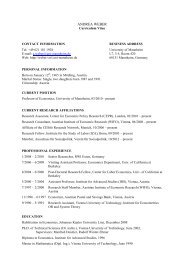Syllabus: The Economics of Discrimination - Prof. Dr. Andrea Weber
Syllabus: The Economics of Discrimination - Prof. Dr. Andrea Weber
Syllabus: The Economics of Discrimination - Prof. Dr. Andrea Weber
Create successful ePaper yourself
Turn your PDF publications into a flip-book with our unique Google optimized e-Paper software.
Mannheim, 06.02.2012<br />
<strong>Syllabus</strong>: <strong>The</strong> <strong>Economics</strong> <strong>of</strong> <strong>Discrimination</strong><br />
Universität Mannheim, Blockseminar, Frühjahr 2012<br />
Pr<strong>of</strong>. <strong>Dr</strong>. <strong>Andrea</strong> <strong>Weber</strong><br />
Termine:<br />
Einführung : Freitag, 17.02.2012, 09:00 bis 12:00<br />
Blockseminar I : Fr. 09.03.2012, 09:00 bis 18:00<br />
Blockseminar II: Sa. 10.03.2012, 09:00 bis 18:00<br />
Course Overview and Objectives<br />
Not all difference results from discrimination. Not all discrimination results in<br />
observable differences. This course will focus on issues <strong>of</strong> difference and discrimination<br />
associated with race, gender, nation <strong>of</strong> birth, or age focusing particularly on the labor<br />
market. We will discuss economic theories that explain discrimination and how<br />
econometrics is used to address questions <strong>of</strong> discrimination.<br />
Enrollment and Course Website:<br />
Please register for the seminar at the Studierendenportal<br />
https://portal.uni-mannheim.de/<br />
Registered students can also access the ILIAS webpage for the seminar, where you find<br />
the program and literature references.<br />
Contact and Office Hours<br />
Pr<strong>of</strong>essor <strong>Andrea</strong> <strong>Weber</strong>, L7, 3-5, Room 4.20, a.weber@uni-mannheim.de<br />
Office hours: Tuesday 14:00 – 15:00.<br />
Appointment: if you cannot make the <strong>of</strong>fice hours, send an email and request an<br />
appointment<br />
Course Requirements<br />
At the introductory meeting, each student selects one <strong>of</strong> the suggested topics (below)<br />
and prepares a 30 minutes presentation based on the literature references and the<br />
material covered in the introduction.<br />
In addition, each student selects a second topic for which she/he prepares a 5 minute<br />
discussion, based on a colleague’s presentation.<br />
During the seminar blocks a time slot <strong>of</strong> 45 minutes is assigned to each topic to allow for<br />
general discussion as well.<br />
Presentation slides have to be sent to <strong>Andrea</strong> <strong>Weber</strong> and the respective discussant <strong>of</strong> the<br />
presentation by March 7 at latest.<br />
After the seminar each students hands in a written report <strong>of</strong> his/her topic summarizing<br />
the presentation and comments from the discussion (maximum 5 pages).<br />
Language: Presentations and written reports can be either in English or German.
Course Grading<br />
Seminar presentaion (60%), oral performance in presentation and discussion (10%),<br />
Written summary (30%).<br />
Program:<br />
Introduction: Friday 17.2. (<strong>Andrea</strong> <strong>Weber</strong>)<br />
How do economists think about discrimination Economic theories <strong>of</strong><br />
discrimination<br />
George J. Borjas, Labor <strong>Economics</strong> (Irwin McGraw Hill), Chapter 10<br />
Becker, Gary (1975): <strong>The</strong> <strong>Economics</strong> <strong>of</strong> <strong>Discrimination</strong>, Second Edition, <strong>The</strong> University<br />
<strong>of</strong> Chicago Press, Chicago.<br />
List <strong>of</strong> Topics with literature references (9.3. and 10.3.)<br />
1. Who are economists Status <strong>of</strong> minority groups in the economics pr<strong>of</strong>ession<br />
Rouse, Cecilia (2009) Report <strong>of</strong> the Committee on the Status <strong>of</strong> Minority Groups in the<br />
<strong>Economics</strong> Pr<strong>of</strong>ession, American Economic Review: Papers & Proceedings, 99:2, 700–<br />
709.<br />
Collins, Susan M. “Minority Groups in the <strong>Economics</strong> Pr<strong>of</strong>ession,” Journal <strong>of</strong> Economic<br />
Perspectives 14 (Spring 2000): 133-148.<br />
6. Evidence <strong>of</strong> <strong>Discrimination</strong>: Audit Studies<br />
Bertrand, Marianne and Sendhil Mullainathan (2003): Are Emily and Greg More<br />
Employable Than Lakisha and Jamal : A Field Experiment on Labor Market<br />
<strong>Discrimination</strong>, NBER Working Paper 9873.<br />
Goldin, Claudia und Cecilia Rouse (2000): Orchestrating Impartiality: <strong>The</strong> Effect <strong>of</strong><br />
'Blind' Auditions on Female Musicians, American Economic Review, 90(4), 715-741.<br />
7. Evidence <strong>of</strong> <strong>Discrimination</strong>: Laboratory and field experiments<br />
Niederle, Muriel, Vesterlund, Lise, 2007. Do women shy away from competition Do men<br />
compete too much Quarterly Journal <strong>of</strong> <strong>Economics</strong> 122 (3), 1067-1101.<br />
Gneezy, Uri, Kenneth L. Leonard, John A. List (2009) Gender differences in competition:<br />
Evidence from a Matrilineal and a Patriarchal Society, Econometrica, 77, No. 5, 1637–<br />
1664.<br />
2. Gender wage differences in Germany and in international comparison<br />
Beblo, M., Beninger, D., Heinze, A., Laisney, F., Measuring Selectivity-Corrected Gender<br />
Wage Gaps in the EU, .ZEW Mannheim, Working Paper, 2003, (03-74).<br />
Al-Farhan, Usamah Fayez (2010), Changes in the Gender Wage Gap in Germany during<br />
a Period <strong>of</strong> Rising Wage Inequality 1999 – 2006: Was it <strong>Discrimination</strong> in the Returns to<br />
Human Capital SOEP paper 293.<br />
Weichselbaumer, D., Winter-Ebmer, R., "A Meta-analysis <strong>of</strong> the International Gender<br />
Wage Gap", Journal <strong>of</strong> Economic Surveys, 2005, 19(3), S. 479-511.<br />
3. <strong>Discrimination</strong> in the labor market: Gender differences in top positions
Holst, E., and A. Busch. "Der "Gender Pay Gap" in Fü hrungspositionen der<br />
Privatwirtschaft in Deutschland," Deutsches Institut fü r Wirtschaftsforschung<br />
(DIW), SOEPpapers 169, 2009<br />
Bertrand, Marianne and Kevin F. Hallock (2001): <strong>The</strong> gender gap in top corporate jobs,<br />
Industrial and Labor Relations Review, 55(1), 3-21<br />
4. <strong>Discrimination</strong> in the labor market: <strong>Discrimination</strong> and beauty<br />
Hamermesh, Daniel S. and Jeff E. Biddle (1994), "Beauty and the labor market",<br />
American Economic Review 84, 1174-1194.<br />
Biddle, Jeff E. and Daniel S. Hamermesh (1998), “Beauty, Productivity and<br />
<strong>Discrimination</strong>: Lawyers’ Looks and Lucre” Journal <strong>of</strong> Labor <strong>Economics</strong>, 16, 172-201.<br />
5. Market competition and discrimination<br />
Sandra E. Black; Philip E. Strahan (2001) <strong>The</strong> Division <strong>of</strong> Spoils: Rent-Sharing and<br />
<strong>Discrimination</strong> in a Regulated Industry, <strong>The</strong> American Economic Review, Vol. 91, No. 4.<br />
pp. 814-831.<br />
Charles, Kerwin, and Jonathan Guryan (2008): Prejudice and Wages: An Empirical<br />
Assessment <strong>of</strong> Becker’s <strong>The</strong> <strong>Economics</strong> <strong>of</strong> <strong>Discrimination</strong>, Journal <strong>of</strong> Political Economy,<br />
116(5), 773-809.<br />
8. <strong>Discrimination</strong> in markets other than the labor market: Education<br />
Currie, Janet and Duncan Thomas, “Does Head Start Help Hispanic Children” Journal <strong>of</strong><br />
Public <strong>Economics</strong> 74 (November 1999): 235-262<br />
Charles, Camille A. et al, “<strong>The</strong> Continuing Consequences <strong>of</strong> Segregation: Family Stress<br />
and College Academic Performance,” Social Science Quarterly 85 (December 2004):<br />
1353-73.<br />
9. <strong>Discrimination</strong> in markets other than the labor market: Crime<br />
Schanzenbach, Max. “Racial and Sex Disparities in Prison Sentences: <strong>The</strong> Effect <strong>of</strong><br />
District-Level Judicial Demographics.” Journal <strong>of</strong> Legal Studies 34 (January 2005): 57-92.<br />
http://www.journals.uchicago.edu/doi/abs/10.1086/425597<br />
Holzer, Harry J; Raphael, Steven; Stoll, Michael A. “Perceived Criminality, Criminal<br />
Background Checks, and the Racial Hiring Practices <strong>of</strong> Employers.” Journal <strong>of</strong> Law and<br />
<strong>Economics</strong> 49 (October 2006): 451-80<br />
10. <strong>Discrimination</strong> in markets other than the labor market: Savings and Wealth<br />
Ladd, Helen F., “Evidence on <strong>Discrimination</strong> in Mortgage Lending,” Journal <strong>of</strong> Economic<br />
Perspectives 12 (Spring1998): 41-62.<br />
Yinger, John, “Evidence on <strong>Discrimination</strong> in Consumer Markets,” Journal <strong>of</strong> Economic<br />
Perspectives 12 (Spring1998): 23-40.
Additional Literature:<br />
Altonji, Joseph G. and Rebecca M. Blank (1999): Race and Gender in the Labor Market, in:<br />
Orley Ashenfelter and David Card, Handbook <strong>of</strong> Labor <strong>Economics</strong>, Volume 3C, North<br />
Holland, Amsterdam, p. 3143-3257<br />
Bertrand, Marianne (2010): New Perspectives on Gender, in: Orley Ashenfelter and<br />
David Card, Handbook <strong>of</strong> Labor <strong>Economics</strong>, Volume 4B, North Holland, Amsterdam, p.<br />
1545-1592<br />
Gneezy, Uri, Muriel Niederle and Aldo Rustichini (2001): Performance in competitive<br />
enviroments: Gender differences, Harvard University.<br />
Niederle, Muriel, Vesterlund, Lise, 2008. Gender differences in competition. Negotiation<br />
Journal 24 (4), 447-463.<br />
Ashenfelter, Orley and Timothy Hannan (1986): Sex <strong>Discrimination</strong> and Product Market<br />
Competition: <strong>The</strong> Case <strong>of</strong> the Banking Industry, Quarterly Journal <strong>of</strong> <strong>Economics</strong>, 101/1,<br />
pp. 149-173.<br />
Anderson, Lisa, Roland G. Fryer, and Charles Holt (2005) <strong>Discrimination</strong>: Experimental<br />
Evidence from Psychology and <strong>Economics</strong><br />
Hunt, J. "<strong>The</strong> Transition in East Germany: When Is a Ten-Point Fall in the Gender Wage<br />
Gap Bad News," Journal <strong>of</strong> Labor <strong>Economics</strong>, 2002, University <strong>of</strong> Chicago<br />
Press, 20(1), pp. 148-169<br />
Gartner, H. and G. Stephan. "How Collective Contracts and Works Councils Reduce the<br />
Gender Wage Gap," Institut fü r Arbeitsmarkt und Berufsforschung (IAB),<br />
Discussion Paper 7, 2004.<br />
Blau, F., and L. Kahn. "International Differences in Male Wage Inequality: Institutions<br />
versus Market Forces," Journal <strong>of</strong> Political Economy, 1996, University <strong>of</strong><br />
Chicago Press, 104(4), pp. 791-836.<br />
Beblo, M. and E. Wolf. “Sind es die Erwerbsunterbrechungen Ein Erklärungsbeitrag<br />
zum Lohnunterschied zwischen Frauen und Männern in Deutschland,”<br />
Mitteilungen aus der Arbeitsmarkt- und Berufsforschung MittAB 4, 36, 2003,<br />
pp. 560-572.<br />
Arrow, Kenneth. “What Has <strong>Economics</strong> to Say about Racial <strong>Discrimination</strong>,” Journal <strong>of</strong><br />
Economic Perspectives 12 (Spring, 1998): 91-100.<br />
Fryer, Roland G., Jr; Loury, Glenn C. “Affirmative Action and Its Mythology.” Journal <strong>of</strong><br />
Economic Perspectives 19 (Summer 2005): 147-62<br />
Crime<br />
Butcher, Kristin F. and Piehl, Anne Morrison. “Why are Immigrants' Incarceration Rates<br />
so Low Evidence on Selective Immigration, Deterrence, and Deportation.” NBER<br />
Working Paper No. 13229 (July 2007). http://www.nber.org/papers/w1322.





